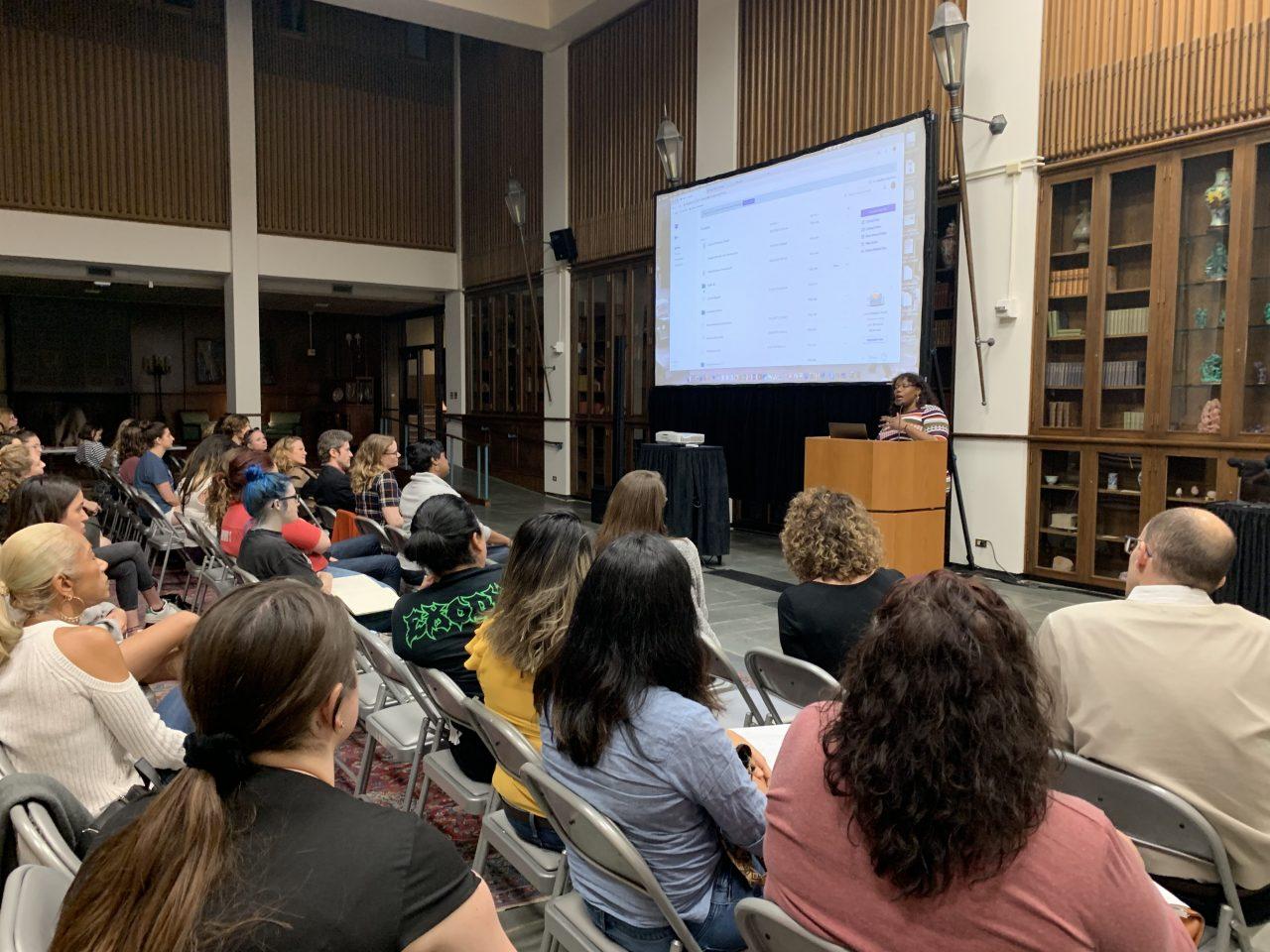Photo provided by Sarah Erickson
“Take one pint of water, add a half pound of sugar, the juice of eight lemons … the zest of half lemon. Pour the water from one jug then into the other several times. Strain through a clean napkin.”
On March 20, in the Chapman Center’s Great Hall, a viewing party of Beyoncé’s visual album “Lemonade,” which was released in 2016, watched and listened as the musical icon explained her grandmother’s recipe.
The viewing event was sponsored by Trinity’s Department of Women’s and Gender Studies (WAGS) as a part of their ongoing Women’s History Month programming. The organizers conceived of the event when thinking about the importance of connecting to Black History Month this February.
“[Kathryn Vomero] Santos, [Jenny] Browne and I were planning Women’s History Month, and we wanted to have some sort of screening,” said Sarah Erickson, professor of communication. “We knew we wanted to do something about women of color, and we knew of Dr. Brooks, who spoke last night. She taught a class that was essentially Black Feminist Theory, but it uses Lemonade as a primary text. And we were like, well, that would be amazing.”
Erickson and her colleagues brought in guest speaker Kinitra D. Brooks for the event in an effort to focus on black female voices. According to the poster for the event, Brooks is a professor in the Department of English at Michigan State University. She co-edited “The Lemonade Reader” and taught a course entitled “Black Women, Beyoncé and Popular Culture” at the University of Texas at San Antonio in the fall of 2016.
Lemonade addresses the aftermath of Beyoncé’s husband’s infidelity through music, choreography, costuming and more. In her introduction, Brooks focused on the multi-faceted nature of the piece, referencing women’s issues, black people’s issues, heterosexual African American relationships, queer identities and the genre of horror.
“In my studies about horror and black women, I say that when black women do horror, we change it. And particularly where horror is often presented as something to be afraid of — something to scare you and make you jump — a lot of times when authors who are women are exploring horror, they will look at horror as a place of power,” Brooks said.
Brooks reminded viewers to think about the album in context of the current world rather than as an isolated event.
“I do believe that it is a contemplation on healing cycles of emotional violence, particularly in heterosexual black relationships. A lot of folks think, ‘Oh, it’s all Beyoncé and Jay-Z’. But I like to talk about it in terms of the Beyoncé character and the Jay-Z character,” Brooks said.
In the question and answer portion of the event, Brooks responded to a question about the women in the video who appeared holding framed photos of their loved ones who were victims of systemic violence.
“It’s about loss,” Brooks said. “It’s about how you heal as a black woman when everything falls apart.”
Despite the heavy nature of the issues in Lemonade, Brooks was able to bring humor and hope to the audience during both her introduction and the question/answer session after the viewing, relating stories of herself and her friends reactions to the work upon its release.
“Black feminist social media went crazy,” Brooks said.
Due to Brooks’s personal connections to San Antonio and the mass appeal of the subject matter, the crowd was made up of more than just Trinity Students. Students from other universities, including UTSA, attended the event, along with other community members of all ages.
“We are really honored that this is a cross-San Antonio event,” said Kathryn Vomero Santos, professor of English, in her introduction of Brooks at the event.
The WAGS department is proud of the successes of the event, but admits to its own shortcomings in terms of planning and representation.
“We are three white women, and we want to be intentionally intersectional in our feminism, and we have been only partially successful in that,” Erickson said. “We have been tasked with programming Women’s History Month, and we do it because we care about it, but because that’s not the No. 1 job we’re meant to be doing [as an academic minor], I think we could have done better at building a coalition in advance.”
The department hopes to improve in all areas through deeper involvement from alumni, faculty, administration and students.
“If you have an idea for an event, bring it to us. Bring it to WAGS, bring it to your professors and we can help make it happen. Just help us build the momentum and the energy. The more people that are willing to put in the work, the less of a burden it is on any individual group or person,” Erickson said. “That’s one way to get involved: talk to us.”








Delight Newlight • Apr 1, 2019 at 10:48 pm
A very interesting and well done article.